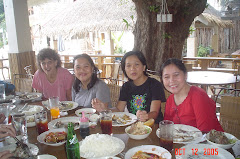I was reflecting on the past GSTs we had with student organizations. Part of this is an orientation on sexuality. Everytime I asked them to raise their hands if they are in a relationship or if they already disclose their sexual identities, i only saw two to four hands raised. I was searching for possible answers...Then, I heard somebody blurted out that "at present, we young people do not label our relationships..." Perhaps, that was one of the answers. So, I asked my older friends. They said the '70s generation (flower power) was similarly like that. They also do not want to label their identities and relationships.
What possibly do they derive in doing so? I, for one, never divulged about my identity and relationships so I have this inkling we are on the same boat. First, divulging or being visible can put one in a stereotypical role or identity. The disadvantage of which is that stereotypes are often molded by media. So, it is not one's creation. Another disadvantage is one can be stigmatized or be put down by anybody who is not respectful of human rights. "To be or not to be", as Shakespeare puts it. For me, the bottomline is individuality. One can truly explore oneself and be everything in every moment without being dictated upon. I believe this is more in accordance with the Tao principle, "Tao is a thing taht is both invisible and intangible...subtle and obscure, there is essence in it (Tao Te Ching, chap 21)" or "when you organize, you must of necessity use names and order; but given that, you must know where to leave off naming and
structuring (chap 32)."
I remembered very well when I called a "gay-looking" student, "Miss", he was angry at with and corrected my signifier. It dawned on me that markers such as clothes and looks could be deceiving because they are markers from the outside of someone who was looking in. Beings are not identifiable fully from what they wear, what they do, what they feel. They must be understood from the knowledge of the dynamics of all of those and from the person/s admittance of her/his wholeness. Dimensions of a human being cannot be well defined and may show off inconsistently depending on the context in which they are examined. Thus, unless they admitted to who they are, we do not have the right to 'out' or 'name' them.
Thursday, September 17, 2009
Subscribe to:
Post Comments (Atom)





2 comments:
One of the rights of a person is privacy and confidentiality. It is up to the person whether or not to share personal information... and if so, the right also who to share it with. Respect to oneself and other people is a key value here.
But I truly admire people who can share oneself with ease. It also takes confidence and humility to be able to do this.
Society, materialist that it is, requires us to name everything. Yes, it is true that naming - most of the time alienates - and it is better to leave a person's identity unnamed as long as he or she desires it to be that way.
But again, this requires a lot of courage for anyone. For it is a ticket to acceptance in society.
Post a Comment